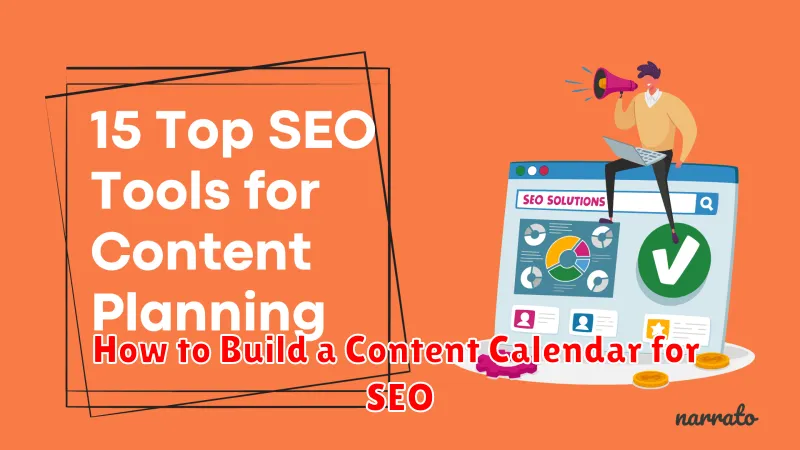A content calendar is a crucial tool for any successful SEO strategy. It provides a structured plan for creating and publishing high-quality, SEO-friendly content, ensuring consistency and maximizing your online visibility. Building a content calendar for SEO allows you to strategically target relevant keywords, track your progress, and ultimately drive more organic traffic to your website. Whether you’re a seasoned marketer or just beginning your SEO journey, a well-crafted content calendar can be the key to unlocking your content’s full potential.
This comprehensive guide will walk you through the process of building an effective content calendar for SEO. We’ll cover everything from keyword research and topic ideation to scheduling and content promotion. Learn how to align your content calendar with your overall SEO goals and optimize your content for maximum impact. By the end of this article, you’ll have the knowledge and tools necessary to create a content calendar that drives results and elevates your SEO performance.
Why a Content Calendar Matters
A content calendar is a crucial tool for any successful SEO strategy. It provides a structured approach to content creation and distribution, allowing you to plan, organize, and manage your content marketing efforts effectively.
With a content calendar, you can maintain consistency in your posting schedule, which is vital for engaging your audience and improving search engine rankings. It helps you avoid the pitfalls of sporadic posting and ensures a steady flow of valuable content.
Furthermore, a content calendar enables you to align your content with specific marketing goals and SEO keywords. This strategic approach ensures that your content is optimized for search engines and resonates with your target audience.
Planning ahead with a content calendar also allows you to capitalize on seasonal trends and important events. This proactive approach can significantly enhance the reach and impact of your content marketing campaigns.
Finally, a content calendar promotes collaboration and efficiency within your marketing team. It provides a centralized platform for managing tasks, tracking deadlines, and ensuring everyone is on the same page.
Start with Keyword Research

Keyword research forms the foundation of a successful content calendar. By understanding what terms your target audience uses when searching online, you can tailor your content to meet their needs and improve your search engine rankings.
Identify Relevant Keywords: Brainstorm keywords related to your business, products, or services. Consider using keyword research tools to discover high-volume, low-competition keywords. Focus on long-tail keywords, which are more specific and have higher conversion rates.
Analyze Search Intent: Understanding the user’s search intent behind each keyword is crucial. Are they looking for information, to buy a product, or something else? Align your content with the user’s goal.
Organize Your Keywords: Group related keywords together into topic clusters. This will help you structure your content calendar and create comprehensive content covering all aspects of a given topic.
Plan Topics by Seasonality
A key aspect of content planning involves aligning your topics with seasonal trends and events. This allows you to capitalize on increased search interest around specific times of the year. By anticipating these peaks in search volume, you can strategically create and promote content that resonates with your target audience.
Consider these factors when planning seasonal content:
- Holidays: Plan content related to major holidays relevant to your industry.
- Seasons: Address seasonal changes and how they impact your audience’s needs.
- Events: Create content around industry-specific conferences, trade shows, or awareness campaigns.
- Weather patterns: If applicable, consider how weather influences product or service demand.
By addressing these seasonal factors, your content becomes more timely and relevant, increasing its potential to rank higher in search results and drive more organic traffic to your website.
Include Publishing Deadlines
Establishing publishing deadlines is crucial for content calendar effectiveness. Deadlines ensure timely content creation and publication, which supports consistent search engine optimization (SEO) efforts. A predictable publishing schedule contributes to a steady flow of fresh content, a factor search engines consider when ranking websites.
When setting deadlines, consider the complexity of the content. In-depth articles, requiring extensive research or complex visuals, necessitate longer lead times than simpler content formats. Account for potential delays in the writing, editing, and review process.
Using a calendar format, either digital or physical, allows for clear visualization of deadlines. Assign specific dates for each stage of content development, from initial drafting to final publication. This structured approach helps maintain momentum and avoid bottlenecks.
Balance Evergreen vs Trend Content
A successful content calendar necessitates a strategic blend of evergreen and trending content. Evergreen content provides long-term value, attracting consistent traffic over time. It focuses on topics relevant regardless of current trends. Think “how-to” guides, tutorials, or glossary terms related to your industry.
Trending content, conversely, capitalizes on current events, hot topics, or viral sensations. This content generates short bursts of high traffic, boosting immediate visibility. Examples include articles discussing recent industry news, reactions to popular events, or content leveraging trending hashtags.
Finding the right balance is key. Too much evergreen content can make your site appear static, while over-reliance on trending topics can lead to volatile traffic patterns. A balanced approach ensures consistent traffic while also capturing opportunities for increased visibility.
Align with SEO Goals
A content calendar should directly support your SEO objectives. Before creating your calendar, clearly define your target keywords and SEO goals. Are you aiming to increase brand awareness, drive traffic to product pages, or improve rankings for specific keywords?
Ensure every piece of content planned is aligned with at least one of these goals. For instance, if a goal is to rank for “best running shoes,” plan blog posts, articles, or videos about running shoe reviews, comparisons, or guides.
Consider the search intent behind your target keywords. Are users looking for information, to make a purchase, or to visit a specific location? Tailor your content accordingly. This alignment will maximize the effectiveness of your content calendar in driving organic traffic and achieving desired SEO results.
Review and Update Monthly
A content calendar requires regular review and adjustments. Dedicate time each month to analyze its performance and make necessary updates. This ensures your content remains relevant, effective, and aligned with your overall SEO strategy.
Key areas to focus on during your monthly review include:
- Content Performance: Analyze which pieces performed well and which fell short. Use data from your website analytics to understand traffic, engagement, and conversions.
- Keyword Rankings: Track your keyword rankings to identify any shifts or opportunities. Adjust your content calendar to address changes in search trends.
- Competitor Analysis: Observe what your competitors are doing. Identify content gaps and potential areas where you can outperform them.
- Upcoming Events & Holidays: Incorporate relevant upcoming events or holidays into your content calendar to capitalize on timely search trends.
- Industry News and Trends: Stay informed about industry news and trends to ensure your content remains current and authoritative.
By consistently reviewing and updating your content calendar, you can maintain a proactive and adaptive SEO strategy, maximizing your chances of success.

